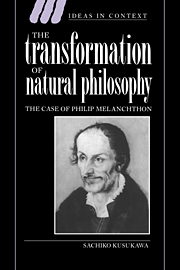Crossref Citations
This Book has been
cited by the following publications. This list is generated based on data provided by Crossref.
Efron, Noah J.
1997.
Irenism and Natural Philosophy in Rudolfine Prague: The Case of David Gans.
Science in Context,
Vol. 10,
Issue. 4,
p.
627.
Siraisi, Nancy G.
1997.
Vesalius and the Reading of Galen's Teleology*.
Renaissance Quarterly,
Vol. 50,
Issue. 1,
p.
1.
Methuen, Charlotte
1997.
“This Comet or New Star”: Theology and the Interpretation of the Nova of 1572.
Perspectives on Science,
Vol. 5,
Issue. 4,
p.
499.
Cameron, Euan
1998.
For Reasoned Faith or Embattled Creed? Religion for the People in Early Modern Europe.
Transactions of the Royal Historical Society,
Vol. 8,
Issue. ,
p.
165.
Jardine, Nicholas
1998.
The Places of Astronomy in Early-Modern Culture.
Journal for the History of Astronomy,
Vol. 29,
Issue. 1,
p.
49.
Johns, Adrian
1998.
Prudence and Pedantry in Early Modern Cosmology: The Trade of Al Ross.
History of Science,
Vol. 36,
Issue. 1,
p.
23.
Gross, Daniel M.
2000.
Melanchthon’s rhetoric and the practical origins of Reformation human science.
History of the Human Sciences,
Vol. 13,
Issue. 3,
p.
5.
Hofheinz, Ralf-Dieter
2001.
Philipp Melanchthon und die Medizin im Spiegel seiner akademischen Reden.
p.
43.
Witte, John
and
Marty, Martin E.
2002.
Law and Protestantism.
Gaukroger, Stephen
2002.
Descartes' System of Natural Philosophy.
Mack, Peter
2002.
Elizabethan Rhetoric.
Kusukawa, Sachiko
2003.
The Medieval Heritage in Early Modern Metaphysics and Modal Theory, 1400–1700.
p.
143.
Crowther‐Heyck, Kathleen
2003.
Wonderful Secrets of Nature.
Isis,
Vol. 94,
Issue. 2,
p.
253.
Pitkin, Barbara
2004.
The Protestant Zeno: Calvin and the Development of Melanchthon’s Anthropology.
The Journal of Religion,
Vol. 84,
Issue. 3,
p.
345.
von Friedeburg, Robert
2005.
The Problems of Passions and of Love of the Fatherland in Protestant Thought: Melanchthon to Althusius, 1520s to 1620s.
Cultural and Social History,
Vol. 2,
Issue. 1,
p.
81.
Dear, Peter
2006.
The Cambridge History of Science.
p.
106.
Feldhay, Rivka
2006.
The Cambridge History of Science.
p.
725.
Blair, Ann
2006.
The Cambridge History of Science.
p.
363.
Kallinen, Maija
2006.
Universities and Science in the Early Modern Period.
Vol. 12,
Issue. ,
p.
111.
Findlen, Paula
2006.
The Cambridge History of Science.
p.
435.





